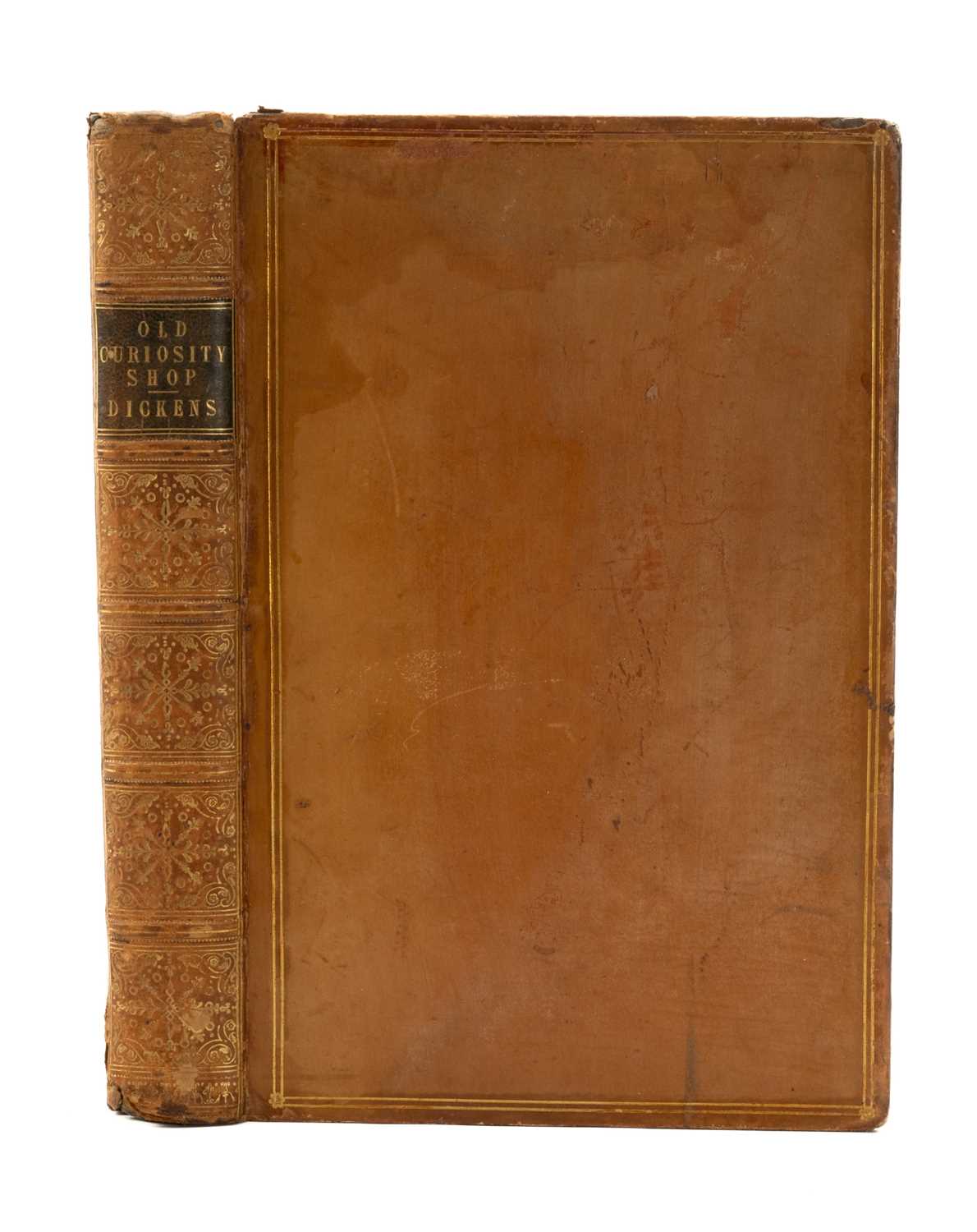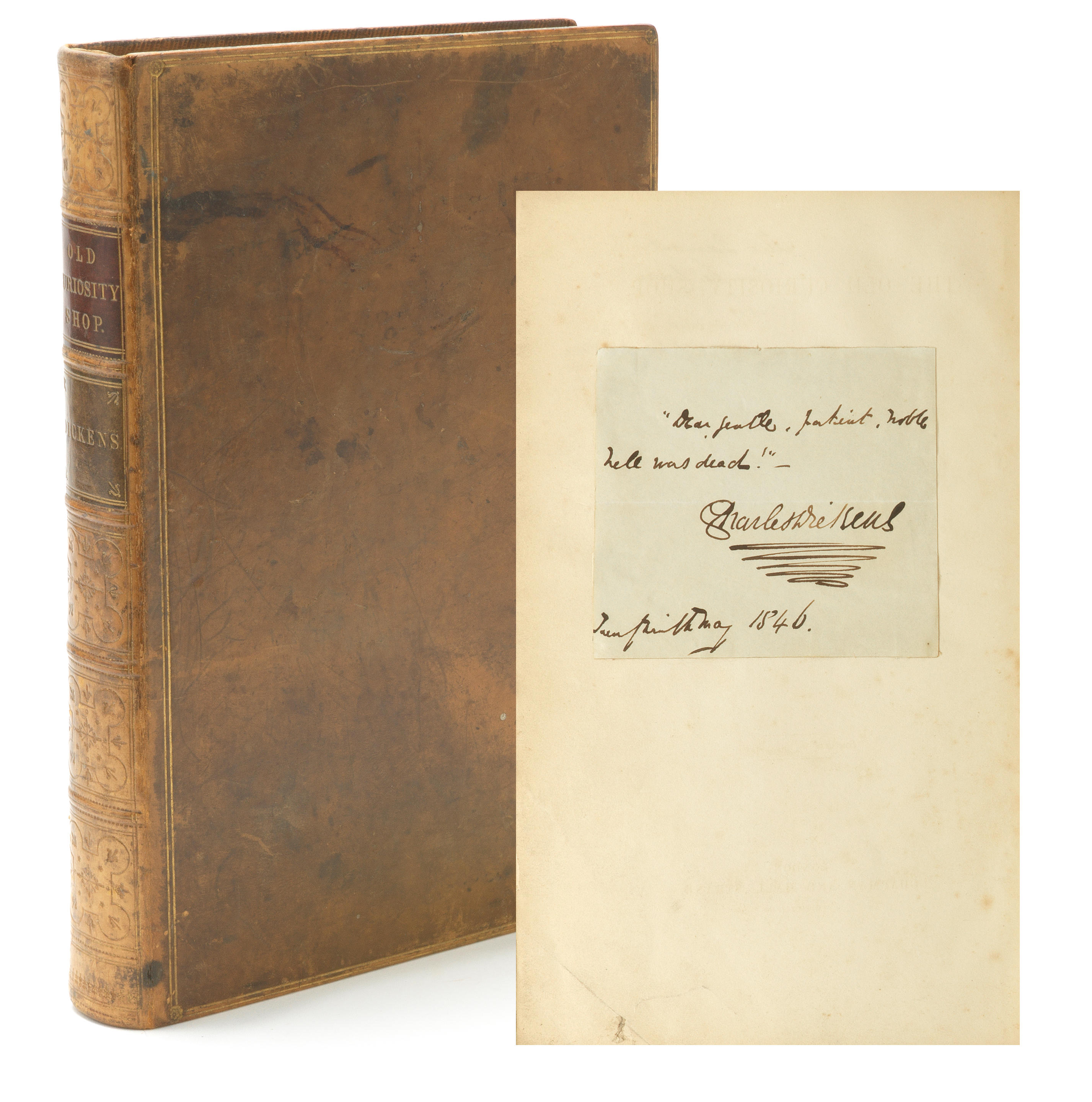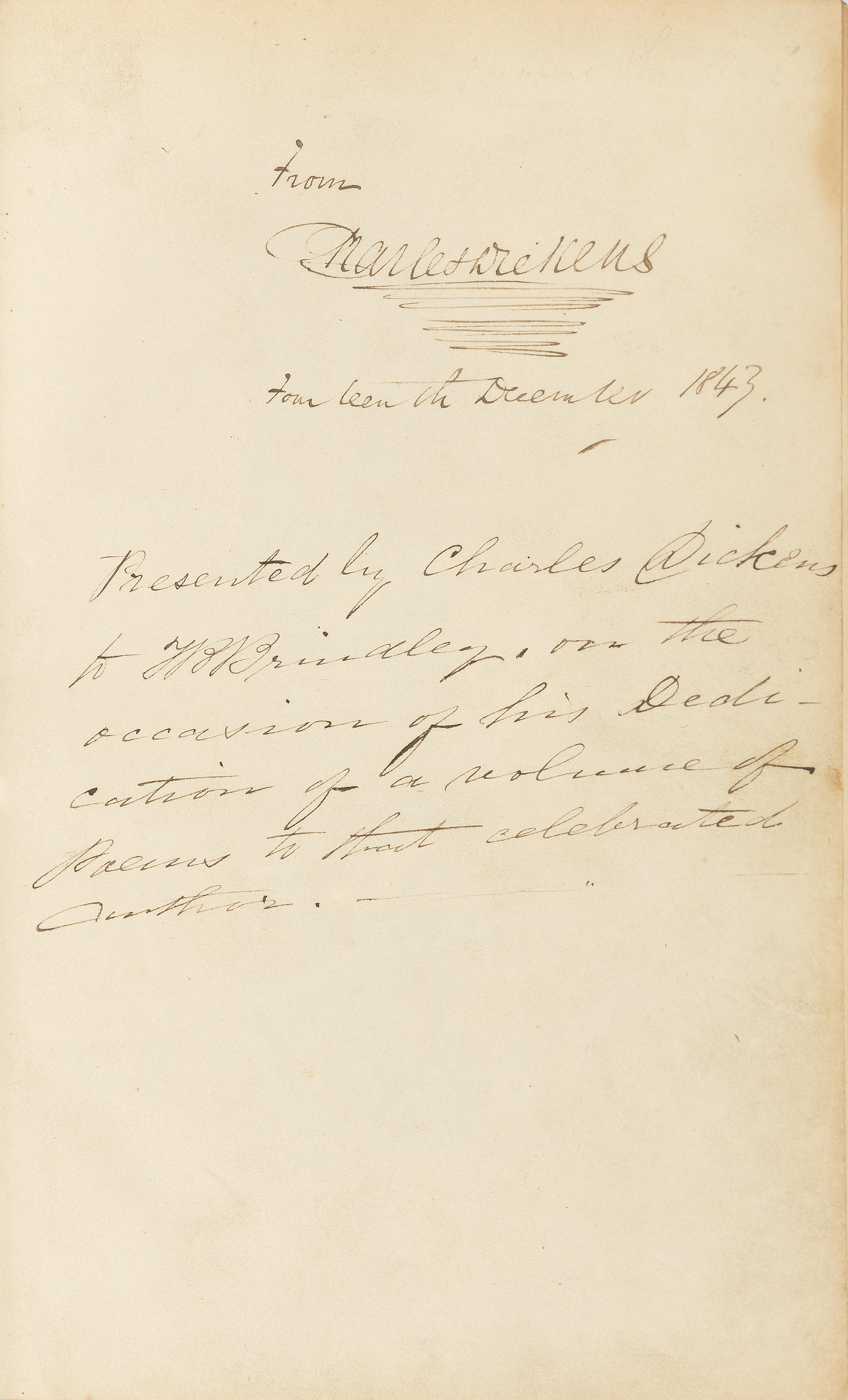DICKENS, Charles. The Old Curiosity Shop and Other Tales. Philadelphia: [C. Sherman & Co. for] Lea and Blanchard, 1842.
DICKENS, Charles. The Old Curiosity Shop and Other Tales. Philadelphia: [C. Sherman & Co. for] Lea and Blanchard, 1842. 8 o (244 x 154 mm). Additional letterpress title-page for Master Humphrey's Clock . Text double-column. Engraved frontispiece, title (dated 1841) and 8 plates after George Cattermole Hablot K. Browne ["Phiz"] and Thomas Sibson by J. Yeager, numerous woodcut illustrations in text. (Some offsetting, occasional pale spotting.) Original brown ribbed cloth, large foliate block blindstamped on covers, gilt-lettered and -decorated on spine (some light rubbing); green quarter morocco slipcase. Provenance : GEORGE P. MORRIS (1802-1864), song-writer, poet and journalist (presentation inscription from the author); Comte Alain de Suzannet (bookplate; his sale Sotheby's, 22 November 1971, lot 59); Kenyon Starling (bookplate). Second American edition, after the first of 1841 the previous year. PRESENTATION COPY, INSCRIBED BY CHARLES DICKENS TO GEORGE MORRIS DURING HIS FIRST AMERICAN TOUR on the title: "George Morris from Charles Dickens New York First June 1842." Dickens inscribed this copy during his first American tour, in 1842. It was a trip that provided Dickens with an immense amount of material: from it came his American Notes , and the seeds for Martin Chuzzlewit , with Martin's journey to the New World becoming a Dantesque passage into darkness. Dickens's depiction of greed and selfishness emerged from his perception of American attitudes and culture. His criticism of America in American Notes enraged American readers, and 20 years later, writing about the Civil War, his opinion seemed little changed. He did not return again to the United States until the winter of 1867-68, when he gave an extensive series of public readings in the East. A VERY FINE ASSOCIATION COPY, INSCRIBED TO THE NOTED AMERICAN EDITOR AND SONG-WRITER GEORGE MORRIS George Morris was well known as editor of New-York Mirror and Ladies' Literary Gazette , which published many of the best authors of the day, including Bryant and Paulding. "After financial problems closed the Mirror in 1842, Morris founded and co-edited with N. P. Willis two short-lived successors, the weekly New Mirror (1843-1844) and a daily newspaper, the Evening Mirror (1844-1845), both of which met with similar difficulties. His next venture, however--the weekly National Press , founded in 1845 and in 1846 renamed the Home Journal (also with assistant editor N. P. Willis)--had great success and returned him to prosperous editorship for the remainder of his life. Like the earlier Mirror , the Home Journal was influential in promoting younger New York writers, and it made Morris a leader of the journalistic establishment" ( ANB ). Dickens wrote to Forster during his American tour that he was "waited upon" by Morris "in the full dress uniform of Heaven knows what regiment of militia." Morris escorted the Dickenses to the theater ballroom that was filled with over three thousand people, and "General Morris" as he was called took "Kate" by the arm ( Letters , Pilgrim edition, III:71). Morris is best remembered, however as a poet and songwriter, and was described by N.P. Willis as the "songwriter of America" and by Edgar Allan Poe as "our best writer of songs." His songs are the most widely known of the antebellum years and include "Woodman, Spare That Tree!" (1837), "My Mother's Bible," "We Were Boys Together," and "I Have Never Been False to Thee." Born in Philadelphia, Morris moved to New York after marrying Mary Worthington Hopkins, the daughter of New York printer and publisher George F. Hopkins, and became active in philanthropic organizations and in the New York State militia, with his honorary rank of brigadier general earning him the nickname "General" Morris. He spent his later years at "Undercliff-on-the-Hudson," a country estate near Cold Springs in Westchester County, New York. The Rosenbach Company catalogue of English Literature, November 1913, offered this and f
DICKENS, Charles. The Old Curiosity Shop and Other Tales. Philadelphia: [C. Sherman & Co. for] Lea and Blanchard, 1842.
DICKENS, Charles. The Old Curiosity Shop and Other Tales. Philadelphia: [C. Sherman & Co. for] Lea and Blanchard, 1842. 8 o (244 x 154 mm). Additional letterpress title-page for Master Humphrey's Clock . Text double-column. Engraved frontispiece, title (dated 1841) and 8 plates after George Cattermole Hablot K. Browne ["Phiz"] and Thomas Sibson by J. Yeager, numerous woodcut illustrations in text. (Some offsetting, occasional pale spotting.) Original brown ribbed cloth, large foliate block blindstamped on covers, gilt-lettered and -decorated on spine (some light rubbing); green quarter morocco slipcase. Provenance : GEORGE P. MORRIS (1802-1864), song-writer, poet and journalist (presentation inscription from the author); Comte Alain de Suzannet (bookplate; his sale Sotheby's, 22 November 1971, lot 59); Kenyon Starling (bookplate). Second American edition, after the first of 1841 the previous year. PRESENTATION COPY, INSCRIBED BY CHARLES DICKENS TO GEORGE MORRIS DURING HIS FIRST AMERICAN TOUR on the title: "George Morris from Charles Dickens New York First June 1842." Dickens inscribed this copy during his first American tour, in 1842. It was a trip that provided Dickens with an immense amount of material: from it came his American Notes , and the seeds for Martin Chuzzlewit , with Martin's journey to the New World becoming a Dantesque passage into darkness. Dickens's depiction of greed and selfishness emerged from his perception of American attitudes and culture. His criticism of America in American Notes enraged American readers, and 20 years later, writing about the Civil War, his opinion seemed little changed. He did not return again to the United States until the winter of 1867-68, when he gave an extensive series of public readings in the East. A VERY FINE ASSOCIATION COPY, INSCRIBED TO THE NOTED AMERICAN EDITOR AND SONG-WRITER GEORGE MORRIS George Morris was well known as editor of New-York Mirror and Ladies' Literary Gazette , which published many of the best authors of the day, including Bryant and Paulding. "After financial problems closed the Mirror in 1842, Morris founded and co-edited with N. P. Willis two short-lived successors, the weekly New Mirror (1843-1844) and a daily newspaper, the Evening Mirror (1844-1845), both of which met with similar difficulties. His next venture, however--the weekly National Press , founded in 1845 and in 1846 renamed the Home Journal (also with assistant editor N. P. Willis)--had great success and returned him to prosperous editorship for the remainder of his life. Like the earlier Mirror , the Home Journal was influential in promoting younger New York writers, and it made Morris a leader of the journalistic establishment" ( ANB ). Dickens wrote to Forster during his American tour that he was "waited upon" by Morris "in the full dress uniform of Heaven knows what regiment of militia." Morris escorted the Dickenses to the theater ballroom that was filled with over three thousand people, and "General Morris" as he was called took "Kate" by the arm ( Letters , Pilgrim edition, III:71). Morris is best remembered, however as a poet and songwriter, and was described by N.P. Willis as the "songwriter of America" and by Edgar Allan Poe as "our best writer of songs." His songs are the most widely known of the antebellum years and include "Woodman, Spare That Tree!" (1837), "My Mother's Bible," "We Were Boys Together," and "I Have Never Been False to Thee." Born in Philadelphia, Morris moved to New York after marrying Mary Worthington Hopkins, the daughter of New York printer and publisher George F. Hopkins, and became active in philanthropic organizations and in the New York State militia, with his honorary rank of brigadier general earning him the nickname "General" Morris. He spent his later years at "Undercliff-on-the-Hudson," a country estate near Cold Springs in Westchester County, New York. The Rosenbach Company catalogue of English Literature, November 1913, offered this and f














Testen Sie LotSearch und seine Premium-Features 7 Tage - ohne Kosten!
Lassen Sie sich automatisch über neue Objekte in kommenden Auktionen benachrichtigen.
Suchauftrag anlegen